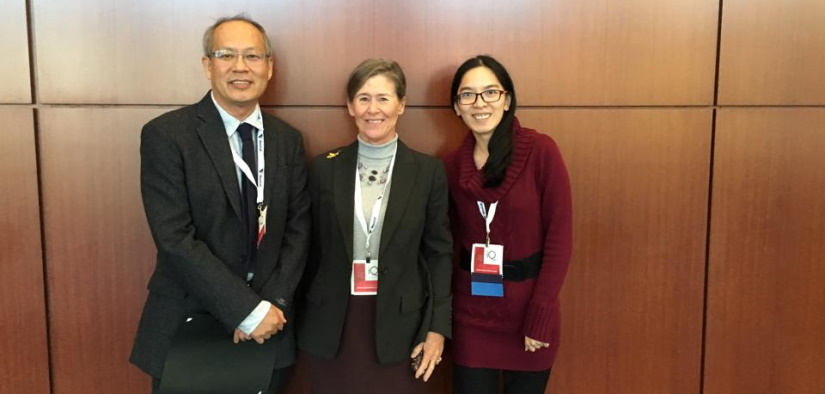January 23, 2020 | Erin Bluvas, bluvase@sc.edu
Yu-Hsiu Lin, a 2015 graduate of the Arnold School’s Ph.D. in Health Services Policy and Management (HSPM) program, has received the Young Scholar Fellowship from the Taiwan Ministry of Science and Technology’s Einstein Program. The fellowship program awards funding to early career faculty at Taiwanese universities to support projects led by researchers with high potential to make an impact in their fields.
An assistant professor at National Chung Cheng University, Lin will lead a project that focuses on posttraumatic stress disorder, social vulnerability and dementia among survivors of the 921 earthquake, a 7.3 earthquake that struck central Taiwan in 1999. Also known as the Jiji earthquake, this natural disaster was the second-deadliest quake in the country’s history, killing 2,415 people, injuring more than 11,000 individuals and causing $10 billion worth of damage.
“I would like to track the earthquake survivors' mental status and associations with dementia,” says Lin, who plans to build machine learning predicted models using data from a national longitudinal study. “Based on my training at UofSC, this study is not only explored at the individual-level but also at the area-level. Furthermore, I also want to create a Taiwanese social vulnerability index with this project.”
She earned associate’s and bachelor’s degrees in nursing from the Chungtai Institute of Health Sciences and Technology and the National Taipei College of Nursing, respectively, and then completed a Master of Business Administration in Health Care at Central Taiwan University of Science and Technology. Lin then gained professional experience as a research assistant at her master’s alma mater’s Department of Senior Citizen Service Management.
It was during her studies in nursing management, that she became interested in health-related management more broadly. This led Lin to pursue her master’s degree, where she met Yia-Wun Liang, an alumnus of the Arnold School’s HSPM department.
“I still remember that he and I participated in the AcademyHealth Annual Meeting 2008 in Washington, D.C.,” says Lin, who then traveled with her mentor to Atlanta to visit Liang’s former HSPM classmate/Ph.D. alumnus, Centers for Disease Control and Prevention Senior Health Scientist William Pearson before stopping by UofSC. “After that experience, I began to think about studying abroad. UofSC was my first choice because I really loved the environment.”
At the Arnold School, Lin served as a teaching assistant in HSPM Distinguished Professor Emerita Janice Probst’s course on advanced topics in health policy and management. She was also a research associate at the Rural Health and Minority Research Center (then known as the South Carolina Rural Health Research Center), where she continued working after her 2015 graduation.
“Dr. Probst inspired and guided me on how to develop my professional career,” says Lin of her mentor. “She wants us thinking independently and creating our own doctoral dissertation topics. She is the best role model for many aspects, such as being a good researcher, teacher, coworker, and so on and is always encourages us to keep moving!"
In 2016, Lin returned to Taiwan to complete a postdoctoral fellowship at the National Institute of Environmental Health Research Center. She then accepted teaching appointments at Taiwanese universities before settling into her current role in the Department of Information Management/Graduate Institute of Healthcare Information Management at National Chung Cheng University. Over time, Lin’s research interests have evolved to focus on health big data analysis, health-related quality of life and rural health among older adults, long-term care supply and demand, spatial analysis in health services research and long-term care – which naturally extended itself to machine learning in her current research program.
She will use a combination of these applications and methods with her project for the Einstein Program, applying interdisciplinary method-machine learning (a branch of artificial intelligence) to build a predicted model. Lin views this exploratory study as a comprehensive application in public health.
As she continues to make her mark on the field of public health, Lin’s contributions are being recognized by her peers and mentors. In December, she won yet another early career award – this time the Excellent Award of Young Scholar Innovation Research from Taiwan Comprehensive University. This research-led university alliance awarded only three of these honors to researchers at its four member institutions this year.
